« on: May 07, 2019, 08:38:10 AM »
 0
0
 0
0
And of them, Plinio Corrêa de Oliveira was one of the best fighters!Declaration of Resistance to the
Vatican Ostpolitik
Plinio Corrêa de Oliveira
Thirty years ago, Prof. Plinio Corrêa de Oliveira published his Declaration of Resistance to the Vatican Ostpolitik with communist regimes.
During the pontificates of John XXIII and Paul VI, the Vatican adopted a tolerant approach toward communist regimes that denied Catholic principles of Faith and social doctrine. This was one of the scandals that marked the post-conciliar era. The last straw that gave rise to Prof. Plinio’s Declaration of Resistance was Archbishop Agostino Casaroli’s visit to Cuba in 1974, and the eulogies of the regime he made in an interview afterward.
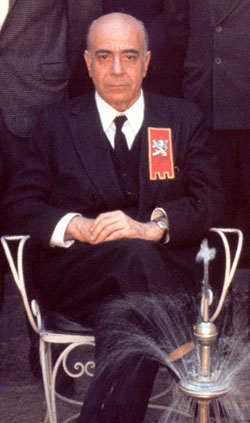 Prof. Plinio Corrêa de Oliveira |
With its Ostpolitik with communist countries, the Vatican was sending an unspoken message to Catholics: Stop fighting against Communism.
To this tacit message, Plinio replied to Paul VI:
Holy Father, order whatever you want, except that we should stop fighting Communism. To this, our conscience refuses obedience. On this matter, we will resist.
The docuмent was widely disseminated, published in 45 newspapers in Brazil, and 21 newspapers in 10 other countries: Argentina, Bolivia, Canada, Chile, Colombia, Spain, the United States, Uruguay, and Venezuela.
Prof. Plinio’s docuмent was probably the first public and articulated exposé demonstrating that Catholics can resist the bad orientation of a Pope based on precedents of History and the voice of conscience.
Specifically, that Declaration of Resistance continues to be very opportune. For, in fact, the Vatican Ostpolitik did not disappear with the fall of the Berlin Wall and the Iron Curtain. Reconciliations with the communist regimes of Russia and other old USSR and “satellites” countries continued to be sought, leaving aside Catholic principles. And, with some few differences, concessions are being made to the governments of Cuba and China.
Today, Tradition in Action pays its homage to Prof. Plinio Corrêa de Oliveira for his prophetic discernment, outstanding courage, and exemplary spirit of Faith, which have inspired – consciously or unconsciously – many Catholic counter-revolutionaries, traditionalists, and conservatives to act in the wake of that historical milestone of Catholic resistance. TIA is proud to be one of these organizations.
The docuмent reproduced below was written by Plinio Corrêa de Oliveira. He signed it as President of the Brazilian TFP and it was endorsed by 15 Brazilian TFP members. Other similar organizations in different countries also endorsed it.
(To know the position of TIA regarding the TFP’s present day orientation, click here)
The Portuguese docuмent was translated and edited by Dr. Marian T. Horvat.
The original title of the docuмent was “The Vatican Policy of Détente Toward Communist Governments – Should the TFPs Give Up the Fight or Resist?”
I – The Facts
Some results of the visit to Cuba of Archbishop Casaroli, Secretary of the Vatican’s Council for Public Affairs, were recently made known to the public. The Prelate himself expounded them in an interview to an important São Paulo daily newspaper (O Estado de São Paulo, April 7, 1974). In it, His Excellency stated, “Catholics who live in Cuba are happy under the socialist regime.” It is not necessary to say what type of socialist regime he is speaking of, since it is well known that in Cuba the regime is communist.
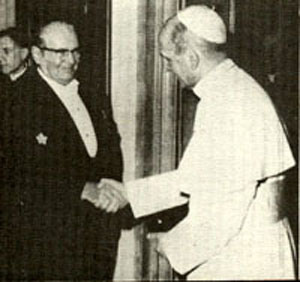 Tito, the communist dictator of Yugoslavia, is cordially received by Paul VI in March 1971 at the Vatican - O Estado de Sao Paulo, March 30, 1971
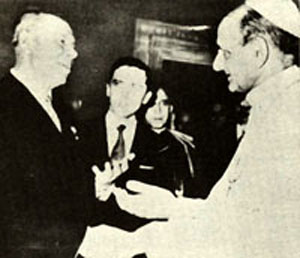
Another example of the Vatican Ostpolitik: In January 1967 Paul VI receives the chairman of the USSR Supreme Soviet, Nicholas Podgorny
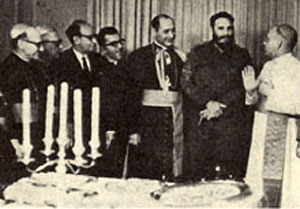
In 1967, Castro is warmly received by the papal nuncio in Cuba, who advises the West to lift economic sanctions from the communist island
Informations Catholiques Internationales, May 15, 1967
Joseph Cardinal Slipyj, the heroic Archbishop-Major of the Ukrainians |
Still referring to Fidel Castro’s regime, His Excellency said: “Catholics and, generally speaking, the Cuban people do not have the least problem with the socialist government.”
Perhaps with the aim of lending a note of impartiality to these astonishing statements, Archbishop Casaroli went on to lament the insufficient number of priests in Cuba, only 200. He also added that he had asked Castro for more opportunities for the practice of public worship. Finally, he affirmed, quite surprisingly, that “the Catholics on the Island are as respected for their beliefs as the other citizens.”
A first glance at these words causes perplexity. Archbishop Casaroli recognized that Cuban Catholics suffer restrictions in their public worship, and he simultaneously affirmed that they are “respected for their beliefs.” As if the right of public worship were not one of the most sacred of their liberties!
If non-Catholics are as respected as Catholics under the Cuban regime, then one can say that no one is respected in Cuba …
So, what is this “happiness” that Cuban Catholics enjoy, according to Archbishop Casaroli? It seems to be the cruel happiness that the communist regime metes out to all of its subjects, that is, a forced submission. Indeed, Archbishop Casaroli confirmed that “the Cuban Catholic Church and the spiritual orientation it gives always try to avoid creating problems for the socialist regime that governs the Island.”
A more profound analysis of these statements of the high Vatican dignitary, however, points to conclusions of a more weighty tone.
At a time when H.H. Pope Paul VI has increasingly stressed the importance of having sufficient material means as a necessary factor for the practice of virtue, it is inconceivable that Archbishop Casaroli should consider Cuban Catholics, who are immersed in misery, as “happy under the socialist regime” of Fidel Castro. From this, one could deduce that, according to Archbishop Casaroli, they would enjoy economic conditions that are at least supportable.
But everyone knows that this is not true. Further, Catholics who take seriously the encyclicals of Leo XIII, Pius XI, and Pius XII know that this cannot be true. For a communist regime, which is the opposite of the natural order of things and the subversion of natural order in economics as well as every other field, can only produce catastrophic fruits.
Therefore, when Catholics world over who are naïve or badly informed about the true social doctrine of the Church read Archbishop Casaroli’s comments about Cuba, they will be induced to draw an absolutely false conclusion. Id est, they would have nothing to fear should Communism be installed in their respective countries, because, according to this hypothesis, Catholics would be perfectly “happy” under such a regime, both with respect to their religious needs and their material conditions.
It is painful to say, but the obvious truth is this: Casaroli’s trip to Cuba ended as propaganda for Fidel Castro’s Cuba.
This episode, repulsive in itself, is but one link in a chain in the policy of détente toward communist regimes that the Vatican has been carrying out for some time now. Several of these incidents are well known to the public.
* One of them was the trip to Russia in 1971 by H. E. Cardinal Willebrands, President of the Secretariat for Christian Unity. The official objective of the visit was to assist at the installation of bishop Pimen as the “orthodox”patriarch of Moscow. Pimen was the person the atheistic Kremlin chose to trust with religious matters. Cardinal Willebrands’ visit to Pimen was, in itself, highly prestigious for the heterodox prelate, justly considered the bête noire [detested] by all the non-communist “orthodox” followers throughout the world.
In a speech before the synod that elected him, Pimen affirmed the nullity of the 1595 act whereby the Ukrainians left the schism and returned to the Catholic Church. This was tantamount to declaring that the Ukrainians should not be under the jurisdiction of the Pope, but under that of Pimen and his accomplices. Instead of reacting to this aggressive attack against the rights of the Catholic Church and the conscience of Ukrainian Catholics, Cardinal Willebrands and his delegation remained silent. Silence is consent, says the Roman Law. Détente…
Naturally, this capitulation profoundly distressed those Catholics who carefully follow the actions of the Holy See. The shock was even greater among the millions of Ukrainian Catholics spread throughout Canada, the United States, and other countries. And it had repercussions in the serious dissensions between the Holy See and H.E. Joseph Cardinal Slipyj, the valorous Archbishop-Major of the Ukrainians, during the Synod of Bishops held in Rome in 1971.
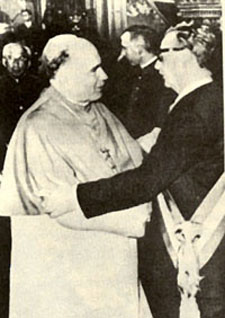 Cardinal Silva Henriquez embraces Allende, the Marxist president of Chile - ICI, March 1 1973
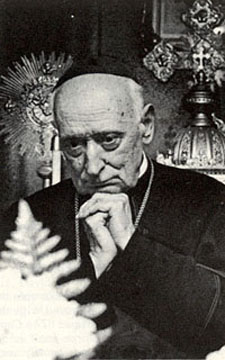
Card. Mindszenty, the pillar that stood firmly against collaboration with Communists |
* The general conduct of H.E. Cardinal Silva Henriquez, Archbishop of Santiago, Chile, constituted another step in the détente with communist governments promoted by Vatican diplomacy. It is notorious …. that the Chilean Cardinal used all the weight of his authority and influence to help Allende ascend to power, be triumphantly installed, and maintained in the presidency up to the moment when this atheist leader committed ѕυιcιdє.
Afterward, in a disreputable effort to cover for himself, the Most Eminent Cardinal Silva Henriquez issued various public statements in an effort to reconcile himself with the post-Allende regime. Notwithstanding, manifestations of his constant empathy for the Chilean Marxists never ceased. A short time ago His Eminence celebrated in his private chapel a funeral Mass for the soul of another communist, “comrade” Toha, an ex-minister of Allende who also committed ѕυιcιdє. Relatives and friends of the deceased were present at this Mass (cf. Jornal do Brasil, March 18, 1974).
The Prelate’s general policy, which by its nature leads Catholics closer to Communism, has not received even the least censure. If someone were expecting the Cardinal to lose his Archdiocese, he has been waiting in vain. Up to now, Cardinal Silva Henriquez has remained tranquilly invested with the mission of leading the souls of his populous and important Archdiocese to Jesus Christ.
* While this Prelate safely conserves his post by implementing the policy of détente with Communism, another Archbishop, on the contrary, has lost his Archdiocese. We refer to one of the Church’s most outstanding personalities of the 20th century, a man whose name is pronounced with veneration and enthusiasm by all Catholics faithful to the traditional social and economic teachings of the Holy See. The name of this Prelate is respected even by persons of the most diverse religions. He is seen as a symbol of glory for the Church even by those who do not believe in her. But this symbol was recently crushed when H.E. Cardinal Mindszenty was dismissed from the Archdiocese of Esztergom to facilitate a rapprochement with the Hungarian communist government.
One can see that the visit of Archbishop Casaroli to Cuba – even disregarding the interview he gave after he left the Island – can be considered a link in the chain of events that have occurred over the last years. Where will this chain end? What other painful surprises, how many more new moral wounds should those who continue to adhere entirely to the immutable social and economic doctrine taught by Leo XIII, Pius XI and Pius XII be prepared for?
We are certain that numerous Catholics, considering these facts, will feel the same perplexity, anguish, and trauma expressed in these lines. The tragic internal crisis they are undergoing is so very profound and poignant because it involves a matter far more acute than mere social and economic questions; it is an essentially religious matter. It regards what is most fundamental, dynamic, and tender in the soul of the Roman and Apostolic Catholic: his spiritual union with the Vicar of Jesus Christ.
II – Roman and Apostolic Catholics
The TFP is a civic association, not a religious one. Its directors, associates and militants are, however, Roman and Apostolic Catholics. Accordingly, the inspiration for all its campaigns undertaken for the good of the country is also Catholic.
The basically anti-communist stance of the TFP comes from the Catholic convictions of those who compose it. Because they are Catholics, it is in the name of Catholic principles that they are anti-communists.
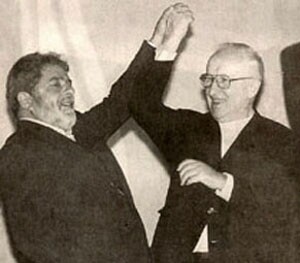
The head of the Brazilian Conference of Bishops Jayme Chemello triumphantly receives the Marxist President Lula at a general meeting of the organization - Diario do Sao Paulo, May 2, 2003
 JPII poses under a billboard of the communist leaders Sandino and Carlos Fonseca. A bold endorsement of the Sandinist revolution - Inside the Vatican, September 2003 |
The Vatican policy of détente with communist governments creates a profoundly difficult situation for anti-communist Catholics, much more as Catholics than as anti-communists. For at any moment they can face a supremely embarrassing objection: Doesn’t their anti-communist position lead them to an objective precisely opposed to the one being sought by the Vicar of Christ? And how can one consider a Catholic to be coherent if he goes in a direction contrary to the one taken by the Pastor of Pastors? This question leads all anti-communist Catholics to an alternative: Should they cease the struggle? Or explain their position?
We cannot cease the fight. A demand of conscience as Catholics will not permit it. Since it is the duty of every Catholic to promote good and combat evil, our conscience calls us to propagate the traditional doctrine of the Church and to fight the communist doctrine.
Presently, the words “liberty of conscience” echo world over throughout the West, and even in the dungeons of Russia… or of Cuba. At times this oft-used expression has acquired abusive meanings. But in its more legitimate and sacred sense, it states the right of the Catholic to act in religious as well as civil life following the dictates of his conscience.
We would feel more enchained inside the Church than Solzhenitsyn was in Soviet Russia if we could not act in consonance with the docuмents of the great Pontiffs who illuminated Christendom with their doctrine.
The Church is not, the Church never was, and the Church never will be such a prison for consciences. The bond of obedience to the successor of Peter, which we will never break, which we venerate in the most profound depths of our soul and to which we tribute our highest love, this bond we kiss at the very moment in which, overwhelmed with sorrow, we affirm our position. And on our knees, respectfully looking to the figure of H.H the Pope Paul VI, we express all our fidelity to the Papacy.
In this filial act we say to the Pastor of Pastors: Our soul is yours, our life is yours. Order us to do whatever you desire. Only do not order us to do nothing in face of the attacking red wolf. To this, our conscience is opposed.
III – The Solution Given by the Apostle St. Paul
 The book published by TIA in April 2000 declaring resistance to any post-conciliar teachings that oppose the previous Magisterium follows in the wake of Prof. Plinio's declaration of resistance 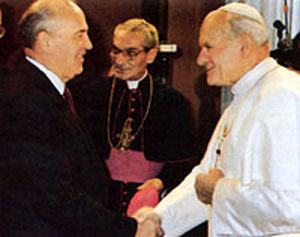 John Paul II gives moral support to Gorbachev when he was on the point of falling from power 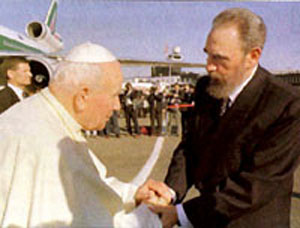 JPII visits Cuba in 1998 to pressure the West to lift the embargo from the island. No advantage for Cuban Catholics came from this visit. For more, click here - Inside the Vatican, October 1998 |
Yes, Holy Father, Saint Peter teaches us that it is necessary “to obey God rather than men” (Acts 5:29). You are assisted by the Holy Ghost and supported – under the conditions defined by Vatican I – by the privilege of infallibility. But this does not mean that in certain matters or circuмstances the weakness to which all men are subject cannot influence and even determine your conduct. One of these fields where your action is subject to error – perhaps par excellence – is that of diplomacy. And this is precisely where your policy of détente toward the communist governments is situated.
What, then, should we do? The limits of this declaration do not permit us to list here all the Church Fathers, Doctors, moralists, and canonists – many of them raised to the honor of the altar – who have affirmed the legitimacy of resistance. This genre of resistance is not separation, it is not revolt, it is not acrimony, it is not irreverence. On the contrary, it is fidelity, it is union, it is love, it is submission.
“Resistance” is the word we choose purposely, for it is used in the Acts of the Apostles by the Holy Ghost Himself to characterize the attitude of St. Paul toward St. Peter, the first Pope, who had taken disciplinary measures to sustain some practices from the old ѕуηαgσgυє in Catholic worship. St. Paul saw in this a grave risk of doctrinal confusion and harm for the faithful. He then stood up against St. Peter and “resisted him to the face” (Gal 2:11). In this zealous and inspired action of the Apostle of the Gentiles, St. Peter did not see an act of rebellion, but rather one of union and fraternal love. Knowing well in what he was infallible and in what he was not, St. Peter ceded to the arguments of St. Paul. The Saints are models for Catholics. Thus, in the sense in which St. Paul resisted, our status is one of resistance.
And with this, our conscience is at peace.
IV – Resistance
To resist means that we will advise Catholics to continue to fight against the communist doctrine with every licit means in the defense of threatened countries and Christian Civilization.
To resist means that we will never use the unworthy resources of ѕєdιтισn nor, much less, take attitudes inconsistent with the veneration and obedience due to the Supreme Pontiff according to the terms of Canon Law.
To resist entails, however, that we will respectfully present our judgment of incidents like the interview of Archbishop Casaroli in which he spoke of the “happiness” of Cuban Catholics.
In 1968, the Holy Father Paul VI was in Bogotá, the prosperous capital of Colombia, for the 39th International Eucharistic Congress. One month later, preaching from Rome to the whole world, he stated that he had seen there a “great need for a social justice that would offer immense numbers of the poor [in Latin America] more just, comfortable, and human conditions of life”(Speech of September 28, 1968).
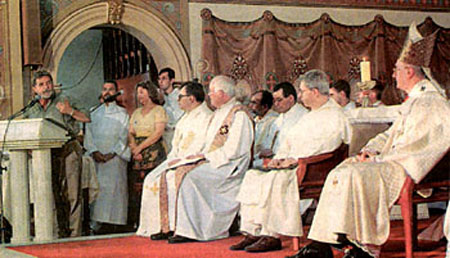 Cardinal Claudio Hummes, far right, gives Communist president Lula the pulpit at a Mass at St. Bernard's Cathedral in Sao Paulo in 2003 - O Sao Paulo, May 7, 2003 |
He said this about a Continent where the Church has complete liberty.
On the contrary, Archbishop Casaroli stated he saw nothing but happiness in Cuba.
In face of this, to resist is to declare with serene and respectful honesty that there is a perilous contradiction between these two statements, and that the fight against communist doctrine must go on.
This is an example of what is true resistance.
V – Internal Panorama of the Universal Church
It is possible that some readers can be surprised by this declaration. The reason is that to date the TFP, reluctant to take this public position of resistance, had not openly addressed the perplexity and non-conformity found among Catholics in diverse countries as a result of the Vatican’s policy of détente with communist governments. Here, we explain our position. But, since to develop the whole topic would over-extend an already lengthy docuмent, we limit ourselves to summarizing a characteristic situation taking place presently among German Catholics. An account of it was given by Herman M. Goergen, a former German Representative and a respectable, upright Catholic (Correio do Povo, Porto Alegre, March 23, 1974).
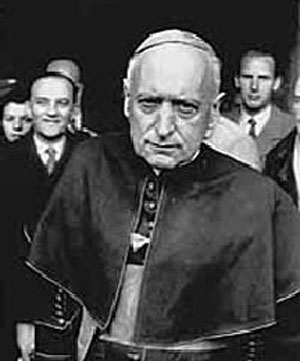 German Catholics support Cardinal Mindszenty, who was dismissed from the Archdiocese of Esztergom by Paul VI
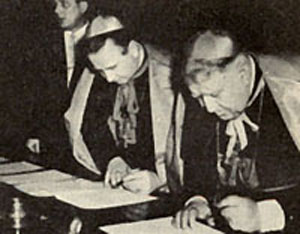
Catholic bishops in Hungary sign an accord of submission to the Communist government in 1964, but later reality showed that the religious persecution did not cease - ICI, May 15, 1965 |
Goergen commented on the launching of two new books on Vatican politics, both by German authors: Wohin steuert der Vatikan? (Where is the Vatican headed?) by Reinhard Raffalt, and Vatikan Intern (Inside the Vatican) published under the pseudonym of Hieronymus. The books “are the major topic of interest among German intellectuals and politicians,” reported Goergen. He considered the work of Hieronymus to be satirical, hyper-critical, and exaggerated. On the contrary, he found Raffalt’s work to be “serious,” supported by “well-founded theses,” and inspired “by a profound love for the Church.” What Raffalt publicly affirms is this: “Pope Paul VI is a socialist.”
Shortly after the release of Raffalt’s scholarly work, Goergen added, a German newspaper published a cartoon showing Paul VI strolling with Gromyko. As they pass by a picture of Cardinal Mindszenty, Gromyko says to Paul VI: “Well, each one has his own Solzhenitsyn.”
Regarding the ousting of Cardinal Mindszenty, Mr. Goergen further noted that a German Jesuit, Simmel, published a critique in the traditional weekly Rheinischer Merkur, “a conservative and intransigent defender of the faith and the Popes.” The article, entitled “No, Mr. Pope” was considered “irreverent” by Rome. In addition, Mr. Goergen affirmed: “A veritable wave of support [for the Cardinal] has swept over German Catholics.” The Frankfurter Allgemeine Zeitung has spoken openly of the “Christian-Marxist dreams” of Pope Paul VI. Also, the Paulus Gesellschaft (Society of Paul), which normally promotes dialogue between Christians and Marxists, condemned the Vatican Ostpolitik, reproving it as “Machiavellian” because it wants to “impose a Rome-Soviet peace on the world.” In view of such critiques, the moderation of the TFP’s appraisal stands in relief.
We cannot close our commentary on Mr. Hermann Goergen’s article without pointing to a serious affirmation he made: In Poland, as in Hungary, Czechoslovakia, and Yugoslavia, the contacts and accords of the regimes with the Holy See have not diminished the intense religious persecution. An analogous affirmation was made by Cardinal Mindszenty with regard to his country.
We are left in a state of perplexity. A supposed attenuation of the anti-religious stance was the grand argument (insufficient in our view) presented by enthusiasts for the Vatican policy of détente. But reality shows that the policy of détente does not attain this objective. It only favors Communism. Cuba is another example of this. Nonetheless, an official promoter of this détente, Archbishop Casaroli, has declared that Catholics are happy living in this regime of persecution. We ask, then, if détente is not synonymous with capitulation.
If it is, how can one not resist the policy of détente, and present to the public its colossal error?
This is another example of how we understand resistance. ...
Conclusion
This exposition was crucially necessary. It has the character of a self-defense of our Catholic consciences regarding a diplomatic policy that was becoming insupportable by placing anti-communist Catholics in a most difficult situation, that is, their position was becoming incomprehensible to the public. We emphasize this, by way of epilogue, at the close of this statement.
No conclusion, however, would be complete without reaffirming our unrestricted and loving obedience to the Holy Church, and the Pope, in the full terms prescribed by Catholic doctrine.
May Our Lady of Fatima help us on this road that we must tread in fidelity to her message, with the anticipated joy that the promise she made will be fulfilled: “In the end, my Immaculate Heart will triumph”.
São Paulo, April 8, 1974

Logged
"Some preachers will keep silence about the truth, and others will trample it underfoot and deny it. Sanctity of life will be held in derision even by those who outwardly profess it, for in those days Our Lord Jesus Christ will send them not a true Pastor but a destroyer." St. Francis of Assisi